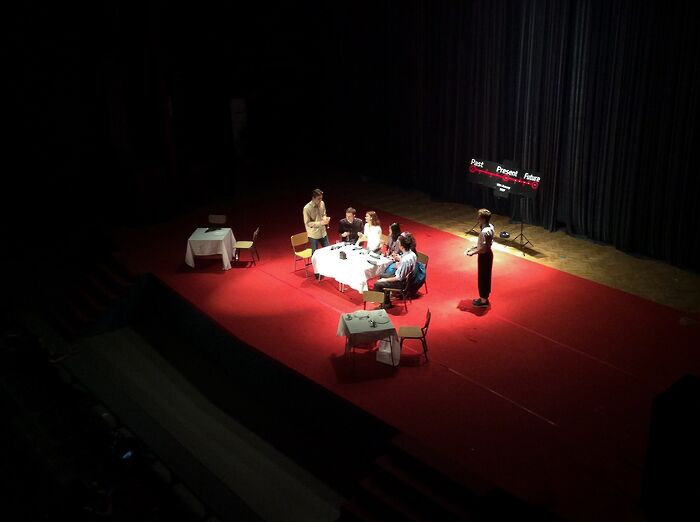The Tempest review
Slick and beautifully terrifying, this show could not get the ADC off to a better start

A month of travelling around the USA, and then back to the brand new ADC for the Cambridge home run. You’d expect a cast of wearied travellers – tanned, perhaps, but just a little bit over the show. What you get with ‘The Tempest’, however, is something quite different. Combine slick choreography with skilled acting and beautifully-designed tech, and the ADC opens with a bang.
The show begins almost like a piece of physical theatre, in a chaos of sea and bodies which move with a power and aggression that both mimics the crashing of the sea and provides a background of movement for Shakespeare’s words. Each actor knows their place, and they come and go, hit the floor and breathe their way back up with a certain smoothness which tells of months of rehearsal and performance. This is Shakespeare not just in words, but also in bodies, whose writhing and falling culminates in the opening lines of the play.
There is something beautiful in the wordlessness of this opening, which is evoked later in the play, too: particularly in the scene where Miranda (Shimali De Silva) dreams of herself and Caliban. The two lithely jump over and under each other, crafting for themselves a whole physical story which expresses their relationship, acting with an ease which nevertheless brings out the tensions of the relationship between the two characters.
Caliban (Conor Dumbrell) is shirtless, deranged; he scuttles around the stage like a kind of animal. Ariel (Milo Callaghan) is similarly portrayed, wearing first a ripped shirt and then none at all, with a look in his eye that seems to take pleasure in the chaos that he causes and the suffering and confusion that he brings. The Ariel that Bruce-Jones gives us, then, is not the light fairy interpreted in so many other productions, but a more terrifying, animalistic, indeed even brutal male figure.
There is certainly strength in Ariel’s portrayal. In one scene, Ariel stands at the centre of the stage, bathed in blue light, arms spread wide in glory: the image is frightening and yet beautiful. The blue light creates a sense of the surreal, of a world beyond the one that we know.
"This island is under a spell, and we are drawn completely into its world"
The lighting is a particularly strong point of this show. The use of torches throughout is exciting, illuminating, watching the characters, crouching beside them as they speak their famous monologues. Torches focus the light, they give it a sense of direction, and the necessity of them being held gives a sense of the omnipresence of these spirits. In the darker moments, where torches are the only light, there are shadows of the characters on the ceiling of the theatre, reinforcing the sense that these spirits are all around us, behind every door and through every wall, projected on every ceiling even now.
The use of sounds in this play is also remarkable: extraordinarily well-managed, it hangs on the edge of subtlety, as background sounds throughout the scenes create a clear atmosphere which surrounds the characters and does not make them speak into a vacuum. This island is under a kind of spell, and we are drawn completely into its world, not allowed or able to leave.
The human interaction with this world is a source not only of tension and intensity in this play, but also of humour. The performance of Toby Waterworth (Antonio) cannot be praised enough; he manages to make his comedy fit in with the genre of the play, throwing a cigarette into the air in a completely absurd and yet playful image. His delivery, too, is hilarious.
There is a such a coherence to this production: the lights, sound, and scenery (the wooden structures evoke the forest while strongly pushing against it, even celebrating its destruction through their strangely dead, varnished state, reconstructed into trees which are far from natural) create this sense of the island’s atmosphere, from which the audience cannot escape. The actors move Shakespeare as well as feel him, using their bodies to add to this sense of the fairytale and the mysterious. And any audience must be won by an endearing shadow play of lovers behind a sheet, whose lifting sets in motion the revelation scene so crucial to the end of Shakespearean comedy. This is a wonderful rendition of such a complexly mysterious play.
 Music / The pipes are calling: the life of a Cambridge Organ Scholar25 April 2025
Music / The pipes are calling: the life of a Cambridge Organ Scholar25 April 2025 Arts / Plays and playing truant: Stephen Fry’s Cambridge25 April 2025
Arts / Plays and playing truant: Stephen Fry’s Cambridge25 April 2025 Comment / Cambridge builds up the housing crisis25 April 2025
Comment / Cambridge builds up the housing crisis25 April 2025 Interviews / Dr Ally Louks on going viral for all the wrong reasons25 April 2025
Interviews / Dr Ally Louks on going viral for all the wrong reasons25 April 2025 News / Candidates clash over Chancellorship25 April 2025
News / Candidates clash over Chancellorship25 April 2025






